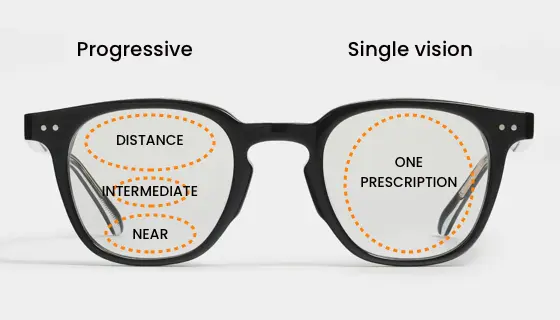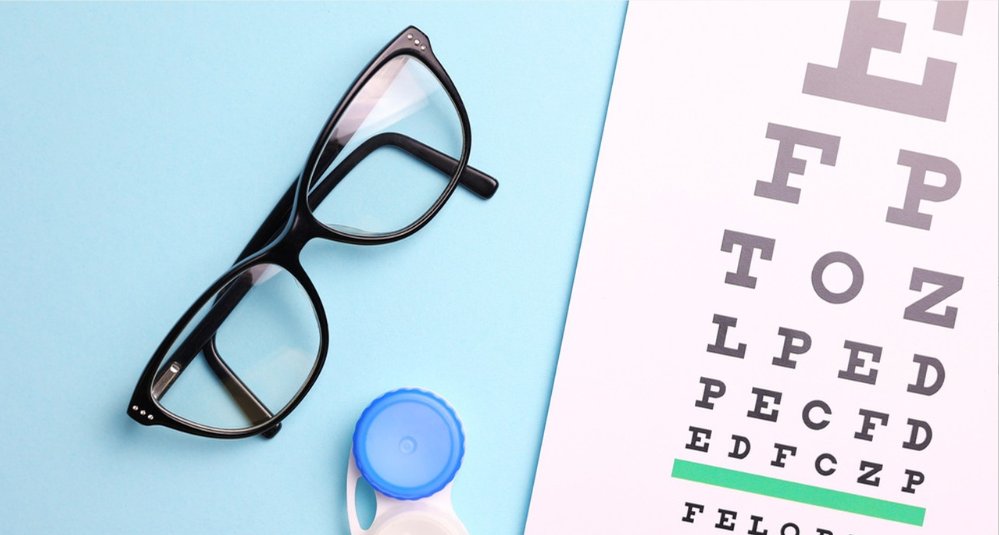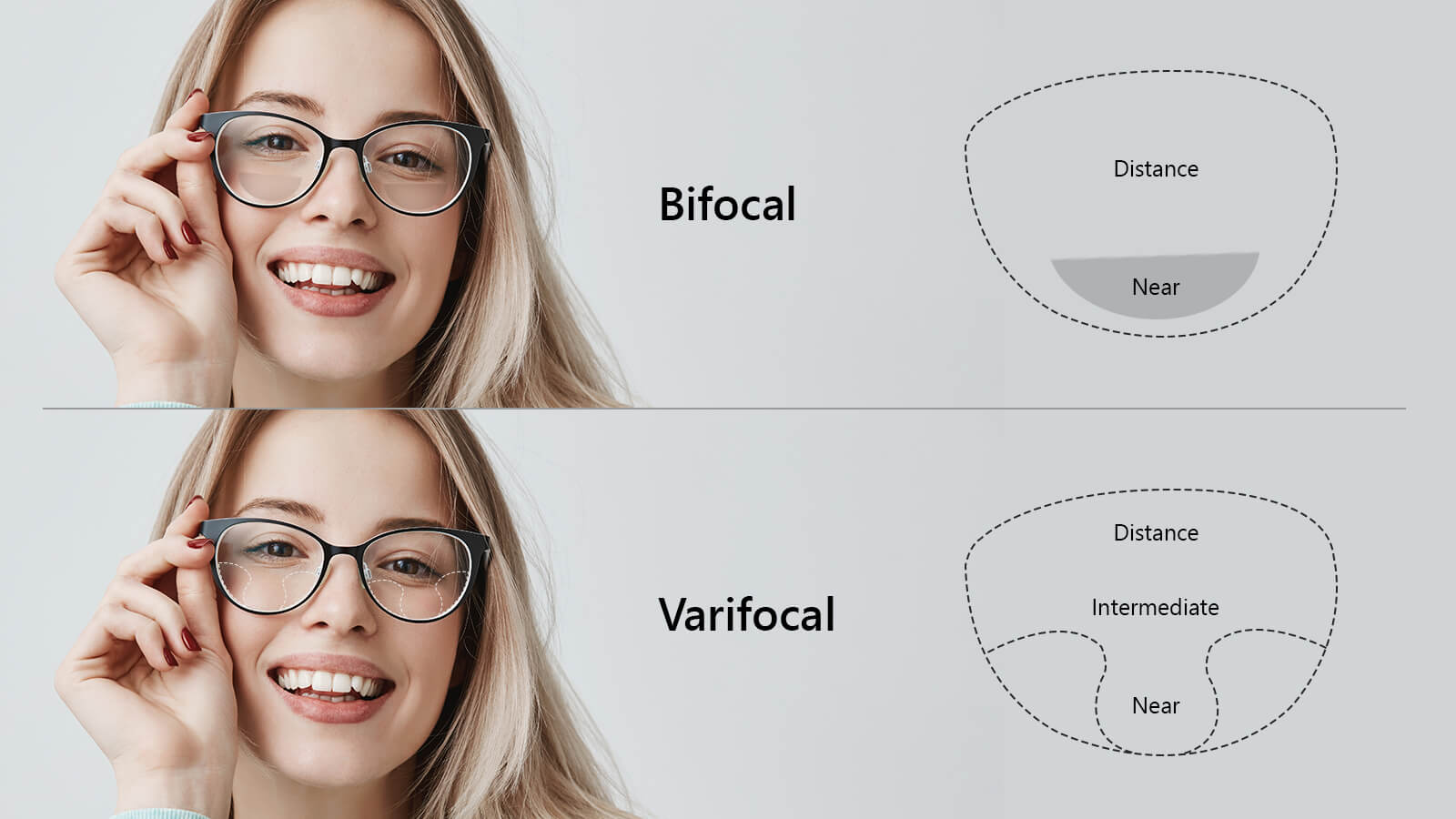Single vision lens: The entire lens has the same prescription power. Designed to correct a vision problem such as nearsightedness or farsightedness. Features a single focus point that provides clear vision at a specific distance (near, medium or far).
Varifocal lens: One lens comes in a variety of prescription powers to correct near, intermediate, and distance vision. Features a gradual change in prescription strength from top to bottom of the lens, allowing for seamless transitions between different viewing distances. Because the prescription strength progresses smoothly from the top to the bottom of the lens, they are also called progressive lenses.
Which is better single vision or multifocal?
When considering whether single vision lenses or multifocal lenses are better for you, there are several factors to consider:
∙ Vision needs: If you only need to correct one type of vision (such as nearsightedness or farsightedness), single vision lenses are better. Multifocal lenses are better suited if you have multiple vision problems or need correction of near and distance vision.
∙ Convenience: Single vision lenses make it easier to perform specific tasks, such as reading or driving, because they are optimized for a single distance. However, if you frequently switch between near and far vision tasks, multifocal lenses can provide a seamless transition between different distances.
∙ Lifestyle: Consider your lifestyle and daily activities. For example, if you spend a lot of time working on a computer or reading, multifocal lenses may be more advantageous because they can provide clear vision at different distances without having to switch between different glasses.
∙ Adjustment Period: It is important to note that some people may need an adjustment period when transitioning to multifocal lenses, as this involves adjusting to the different focal points. Single vision lenses usually do not have this adjustment period.
∙ Eye Health: Your eye health and any underlying conditions may also affect your choice of single vision lenses versus multifocal lenses. Your eye care professional can provide guidance based on your specific eye health needs.
In summary, the better choice between single vision lenses and multifocal lenses depends on your personal vision needs, daily activities, and eye health. It is important to discuss these factors with your eye care professional to determine the best option for you.

How do l know if l need single vision or progressive lenses?
To determine whether you need single vision lenses or progressive lenses, consider the following factors and discuss them with your eye care professional:
∙ Presbyopia: If you are over 40 and have difficulty seeing close objects, you may have presbyopia. Progressive lenses help solve this age-related problem by providing a seamless transition from distance vision at the top to near vision at the bottom.
∙ Multiple vision needs: If you have different vision needs for distance, intermediate, and near vision, such as reading, computer work, and driving, progressive lenses can provide clear vision at all distances without the need to switch between multiple pairs of glasses.
∙ Lifestyle and daily activities: Consider your daily activities and how often you switch between different visual tasks. If you frequently switch between near and distance vision tasks, progressive lenses can provide convenience and seamless vision correction.
∙ Eye Health: Certain eye health conditions or vision problems may indicate the need for specific types of lenses. Discuss any eye health concerns with an eye care professional to determine the best lens options for your needs.
∙ Preference and comfort: Some people may prefer the convenience and aesthetics of progressive lenses, while others may find single vision lenses more comfortable for specific tasks.
Ultimately, a comprehensive eye exam and discussion with an eye care professional will help determine whether single vision lenses or progressive lenses are best for your vision needs and lifestyle. Based on your unique requirements, an eye care professional can recommend the most appropriate lens options for you.
Yes, single vision lenses can correct astigmatism. Astigmatism is a common refractive error caused by an irregularly shaped cornea or lens inside the eye, causing blurred or distorted vision at different distances. Single vision lenses can effectively address astigmatism by incorporating the necessary corrective power to compensate for the irregular curvature of the eye's optics. When it comes to correcting astigmatism, single vision lenses can be customized to the specific prescription needed to offset the refractive error associated with the condition. This prescription is determined through a comprehensive eye exam performed by an eye care professional, which includes measurements to evaluate the degree and direction of astigmatism in each eye. Single vision lens prescriptions to correct astigmatism usually include a cylindrical power component in addition to the spherical power. Cylinder power is critical to account for changes in the curvature of the cornea or lens, ensuring that light is refracted and focused correctly onto the retina. By incorporating this specific astigmatism correction into the lens design, single vision lenses can effectively compensate for the blur and distortion experienced by people with astigmatism. It’s worth noting that single vision lenses for astigmatism are versatile and can meet a variety of vision needs, including distance, near, or intermediate vision. Whether used for glasses or contact lenses, these lenses are suitable for people of all ages with astigmatism, thus meeting a wide range of lifestyle and visual requirements. If prescribed correctly, single vision lenses for astigmatism can provide comfort and vision. By addressing irregularities in eye shape, these lenses enable individuals to improve focus, reduce eye fatigue, and enhance overall visual quality. This helps provide a more comfortable and satisfying visual experience for those who rely on single vision lenses to correct astigmatism. In summary, single vision lenses are able to correct astigmatism by incorporating a customized prescription that takes into account the specific refractive error associated with astigmatism. By providing customized correction, these lenses are designed to optimize vision for people with astigmatism and improve overall vision quality.

Post time: Feb-01-2024

